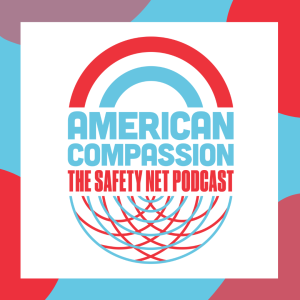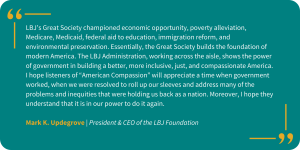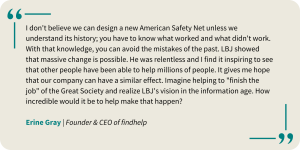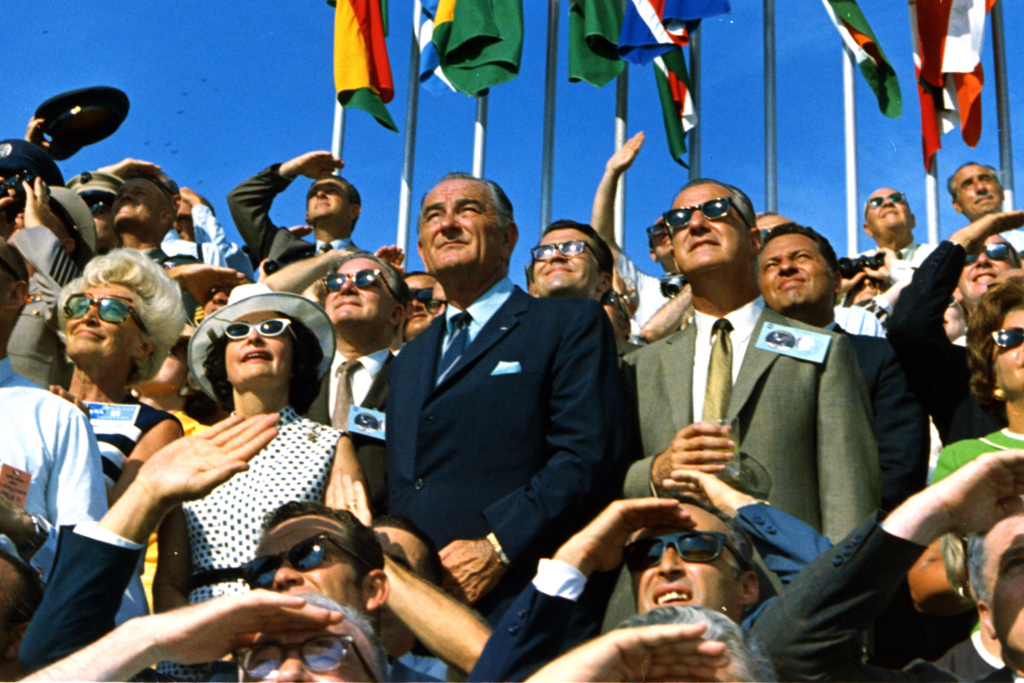“American Compassion” Podcast: LBJ and the American Social Safety Net
On January 8, 1964 (60 years ago today!) President Lyndon Baines Johnson (LBJ) gave the State of the Union address to the United States Congress. During his speech, LBJ proposed legislation as “an all-out war on human poverty” in response to a national poverty rate of around nineteen percent: “This administration today, here and now, declares unconditional war on poverty in America”.
In honor of this declaration and LBJ’s progressive legacy, we’re launching season two of American Compassion, our podcast about the history of the social safety net in America.
From the New Deal to the Great Society
In season 1 of American Compassion we went back in time to the turn of the 20th century to explore poverty and wealth, philanthropy and charity, work, health and politics, and policy at a time when the idea of a safety net was just a dream, and we dove deep into what and who it took to make those dreams a reality. From workplace safety, fair labor standards, and child labor laws to the New Deal, we scratched the surface of the complex history of the social safety net in America.

In season 2, we explore not only what programs and legislation President Johnson created to build the safety net we have today, but we also delve into why LBJ was so committed to civil rights, education, economic opportunity, and so much more. We do this through both archived recordings and speeches and interviews with Pulitzer Prize-winning biographer Robert Caro. Other guests on the podcast include biographers, economists, policy advisors, and historians, H.W. Brands, Julian Zelizer, Guian Mckee, Mark Updegrove, Martha Baily, Andrew R. Smith, Melody Barnes, and Erine Gray.
Episode 1: Taking The Reins and Passage of The Civil Rights Act
In May of 1964, six months before he would be elected president of the United States in a landslide victory, President Johnson laid out his vision for The Great Society in a speech at the University of Michigan: “The Great Society rests on abundance and liberty for all. It demands an end to poverty and racial injustice, to which we are totally committed in our time.” It was there that he was to begin his life’s work, with “liberty for all”. Passing the civil rights bill was crucial for Johnson, not only because he was continuing Kennedy’s legacy, but because it was a foundational piece of his Great Society and the American Safety Net.
In this episode we explore Lyndon Baines Johnson the man and the president with Pulitzer Prize-winning biographer Robert Caro, we hear conversations between LBJ with Martin Luther King Jr. and we get a better understanding of the context and the consequences of this monumental moment in American history.

Episode 2: The (Revolutionary) Economic Opportunity Act
It’s the summer of 1964 and Lyndon Johnson has just signed the most sweeping civil rights legislation since Reconstruction, but when it came to the safety net Johnson’s vision encompassed far greater legislation. President Johnson was willing to wager his presidency on the War on Poverty – but why?
In this episode, we will pull apart the fine details of the Economic Opportunity Act and hear some conversations that illustrate the tension and the stakes of creating some of the most revolutionary safety net programs of the 20th century. We’ll talk about why the War on Poverty and programs like Community Action, Job Corps, and Head Start were so important to LBJ as a person and as president, and we’ll talk about the compromises it took to create and pass this legislation. In addition, we’ll explore the impact of programs like the Job Corps through the experiences of George Foreman.

Episode 3: The Road to Realization for Medicare and Medicaid
By passing the Civil Rights Act on July 2, 1964, and The Economic Opportunity Act on August 20, 1964, President Lyndon Johnson continued the work of Franklin Roosevelt as an interim president before he was elected in his own right in November of 1964. However, there was a significant element of the safety net that no president before LBJ was able to conquer, and that was healthcare. In this episode, we explore Medicare’s tenuous, little-known road to realization and the masterminds behind its conception.

Episode 4: The Legacy of The War on Poverty
In his State of the Union address on January 8, 1964, Johnson says, “This administration here and now declares unconditional war on poverty in America.” But we still see poverty in America today; does that mean the War on Poverty failed? In this episode, we’ll look at the legacies of the Great Society, the War on Poverty, and LBJ’s presidency. What did the policies that came out of his administration mean for the American Safety Net, and why aren‘t more people aware of LBJ’s social policy legacy?

Partner With Us to Rebuild the Safety Net
If you’d like to learn more about how we partner with more than 600 customers nationwide to rebuild the social safety net, connect with us.
